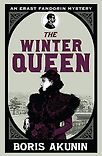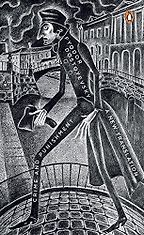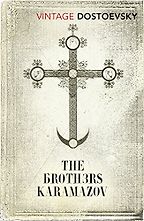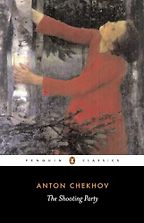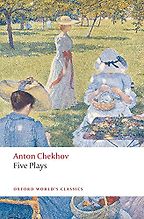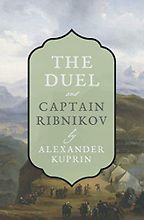You’re known to many fans of detective fiction for your mysteries set in Tsarist Russia, featuring Erast Fandorin as your sleuth. These books you’ve chosen for us today don’t seem to be so much in that genre, they look more like some of the classics of Russian literature. In what sense are these five books mysteries?
The detective genre per se did not exist in Russia until very recently. When it flourished in the 20th century, Russia was a communist state. You were not supposed to have interesting crimes in the country of social harmony, crime was supposed to be a decadent capitalist anomaly. In real life of course there were many crimes happening, but they were never publicised. There existed a lame genre of ‘militseiski detektiv,’ ‘militia detective,’ where righteous militiamen chased and arrested (with the help of citizens) pitiful degraded individuals, none of them picturesque or fascinating, no Moriarties there. It was very boring reading. The genre started developing only in the 1990s.
That’s why the titles of my choosing are not real detective stories and only some of them can be called mysteries, but they are all about crime and they all are great literature.
Let’s turn to your first choice, Crime and Punishment by Fyodor Dostoyevsky—arguably the most famous crime novel of all time. Tell me more about this book and why it’s on your list.
There was a real murder in Moscow in 1865, two elderly women killed by axe. Dostoyevsky was deeply moved by this crime. When a writer is deeply moved, he writes a novel. When it is a great writer, the story turns out to be a great novel. Crime and Punishment is on my list because I wrote my own version of the events. In a novel called F.M. (Dostoyevsky’s initials, Fyodor Mikhailovich) I introduce a newly discovered manuscript by Dostoevsky, a first version of Crime and Punishment, and it is a 100% mystery about a serial killer.
I don’t think your version is available in English (yet). Without giving too much away — can you give us a clue about what happens in your book? Does the appearance of a serial killer mean Raskolnikov did not kill his landlady as we’ve been led to believe all these years?
The novel F.M. is a double mystery. On level 1, in modernity, it describes a chase for a newly discovered version of Crime and Punishment, a manuscript written by the great writer himself. It would cost many millions if sold at an auction. We can read the manuscript chapter by chapter as they are found one after another, and this is Level 2, where the events of the classical novel take an unexpected turn. Raskolnikov is a suspect there, but the story is much more complicated.
You’re sticking with Dostoyevsky for your second choice. What’s The Brothers Karamazov about? Is it really a mystery?
Now, The Brothers Karamazov is a real detective novel, a very rare phenomenon for 19th-century Russian fiction. We have a mysterious murder here, we have several suspects, we have a courtroom investigation, and we do not know eventually, not for sure, who is the culprit.
This is a great Russian novel, so also quite long. Do you think for people who enjoy crime fiction the suspense is enough to carry them to the end?
Yes, The Brothers Karamazov is very long-winded. No one reads the novel as a suspense. It is a study of the human soul’s complexity, a tale about the magic and curse of passion, a clash between Mind and Heart. It is a detective story, but a strange one.
Next up is The Shooting Party by Anton Chekhov, his only novel, I believe, and written when he was 24 or so. This is maybe more a mystery in the conventional sense. Tell me more.
This was a young writer’s attempt to write a financially successful thriller. The protagonist (and the narrator) is a court official investigating a murder of a young woman. It is a crime of passion, that much is evident, but there are several suspects, one of them is arrested and convicted. In the end, it turns out that the murder was committed by the investigator himself, so the novel might have been Agatha Christie’s inspiration for The Murder of Roger Akroyd. Dame Agatha did the job much better of course. As a mystery author, Chekhov is hopeless: too slow, easily distracted, and more interested in the mystery of soul.
Can you tell me a bit about Chekhov. Which book/play/story of his is it best to start with?
The Duel is my favourite. It is so clinically honest about humans, so bitter, so cold – and at the same time so kind, humane, full of understanding and forgiveness that it scratches your heart.
We’re staying with Chekhov for your fourth choice, one of his best-known plays, The Seagull. What’s it about and how does it relate to mystery?
Many would argue that Chekhov’s play The Seagull is not a crime story because the main character shoots himself (we are told in the last scene). Well, my theory is that Chekhov did not understand what really happened there. Konstantin had absolutely no motive for suicide, hence he was murdered. By one of the other characters. So this is a classical hermetic whodunit. I wrote a play (again) called “The Real) Seagull where I investigate what could have happened there.
Do you think Chekhov would have approved of you continuing his play and turning it into a murder story?
Once, when I was speaking at the philology faculty of Moscow University, a professor asked me how dared I mock the great Anton Pavlovich Chekhov. (That was before I mocked Dostoyevsky, wrote my version of Hamlet and committed other similar sacrilegies. Chekhov was my first blood). I said that a work of classics is alive only as long as it encourages readers to challenge it and to argue with it. If not, it’s just history of literature. Respected but boring. Like the Illiad.
Lastly, we have Captain Rybnikov, a novella by Alexander Kuprin that appeared in 1905. I hadn’t heard of this before. Is it a bit of a spy story?
Yes, it is a story about a demonical Japanese spy fooling poor credulous Russians. Don’t laugh please but I wrote a remake of this story too, only my version is about 20 times thicker than the original – a novel called The Diamond Chariot. The protagonist, Erast Fandorin, a gentleman sleuth, travels to 19th-century Yokohama and gets into all sorts of adventures. There are 2 volumes. The first is constructed as a haiku, the Japanese three-liner of 17 syllables, with a non-transparent meaning. There are 17 chapters and the end is totally non-transparent. The second volume, much bigger, explains the mystery. Captain Rybnikov is an important character there. And my novel starts with the same paragraph as Kuprin’s novella.
Did you start the series just for fun because you enjoyed the mystery genre or (like Gibbon’s Decline and Fall and other books about the past) was it a way to write about the present while avoiding direct criticism of the political status quo?
I started the Erast Fandorin series, my first fiction project, after a long reflection on how to become rich and famous without hard work, having fun. I was 40, I was bored with my profession of literary editor and critic. The only skill I possessed was playing with words and ideas. My favourite pastime was computer games. I combined it all and made a living out of it.
Boris Akunin (who was born Grigory Chkhartishvili in Soviet Georgia and lives in exile in London) is at the Oxford Literary Festival on Monday 18 March 2024 at 6pm, as part of its new annual Programme of Georgian Literature and Culture, founded and directed by writer and critic Maya Jaggi.
Five Books aims to keep its book recommendations and interviews up to date. If you are the interviewee and would like to update your choice of books (or even just what you say about them) please email us at [email protected]
Five Books interviews are expensive to produce. If you've enjoyed this interview, please support us by donating a small amount.

